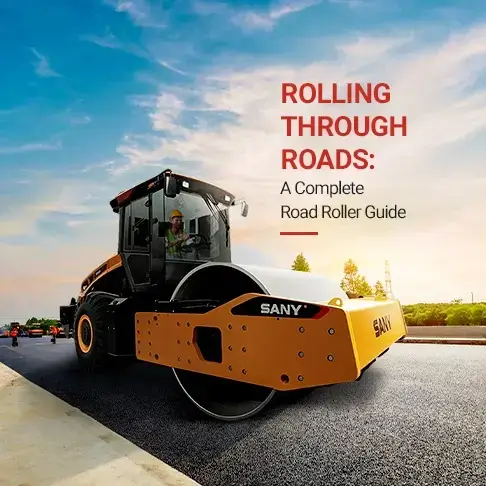Have you ever thought about how the roads we drive on every day get that smooth, solid finish? It’s all thanks to road rollers—those large, powerful machines you often see at construction sites. Though they might not look flashy, they play a vital role in creating safe and dependable roads. Whether you’re new to the world of construction or an old hand, understanding road rollers is essential for getting the job done right. In this post, we’ll dive deeper into the different types of road roller machines, along with some basic maintenance tips to keep them running smoothly. Road rollers come in a variety of types, each designed for specific tasks and terrains. Let’s explore some of the most common ones. Vibratory rollers are the workhorses of road construction and repair projects. These rollers use vibrations to compact soil and asphalt, ensuring uniform density and a smooth finish. The vibrations cause soil particles to shift and settle tightly together, creating a stable foundation for roads, driveways, and other paved surfaces. Vibratory rollers are particularly effective when compacting both granular materials and asphalt, making them versatile tools for many construction applications. Operators can adjust the intensity of the vibration to suit the project’s specific needs. These rollers are often equipped with multiple frequency settings, which allow for precise control over the compaction process. Whether you’re building a highway or repairing a small driveway, vibratory rollers are a go-to choice for achieving consistent compaction results. Pneumatic rollers stand out from vibratory rollers due to their use of rubber tires instead of steel drums. This design makes them more flexible and adaptable, allowing them to handle a wide range of applications. Pneumatic rollers are frequently used to seal and finish asphalt surfaces, providing excellent compaction and traction. Their rubber tires conform to the surface’s irregularities, ensuring uniform compaction without damaging the pavement. One of the standout features of pneumatic rollers is their ability to adjust tire pressure. This allows operators to fine-tune the compaction effort based on the specific conditions of the job site. Whether you’re working with cohesive soils or base materials, pneumatic rollers can deliver the desired results with precision. Static rollers, sometimes referred to as smooth-wheel rollers, apply pressure to the surface without using vibrations. These rollers are typically used for finishing touches and compacting thin layers of asphalt or soil. Static rollers are ideal for achieving smooth and even finishes on paved surfaces like roads, parking lots, and driveways. They distribute weight evenly across the surface, gradually compacting the material below. While static rollers may not offer the same versatility as vibratory or pneumatic rollers, they are essential for achieving the final surface smoothness and density required for high-quality pavements. Often, static rollers are used in conjunction with vibratory or pneumatic rollers to ensure optimal compaction results. Road rollers are indispensable in numerous construction and maintenance projects, helping to ensure the long-term integrity of road surfaces. Proper maintenance is crucial for extending the lifespan and performance of road rollers. Road rollers are essential tools in road construction and maintenance, ensuring safe and durable surfaces. By understanding the different types of road rollers, their applications, and maintenance requirements, you can make informed decisions to achieve successful projects. Choosing the right road roller is also critical for optimal results. Sany, a leading construction machinery manufacturer, offers a wide range of road rollers designed to meet the varied needs of contractors and construction professionals. With advanced features, superior performance, and exceptional reliability, Sany road rollers are trusted globally to deliver outstanding results. For more information on road roller machine prices and product options, visit our website. Round Hole Perforated Metal,Stainless Steel Perforated Sheet For Filtration,round hole perforated metal sheet,round hole perforated sheet screen Hebei Yingkang Wire Mesh Product Co.Ltd , https://www.wiremesh-china.com
Types of Road Rollers
Vibratory Rollers
Pneumatic Rollers
Static Rollers
Applications of Road Rollers
Maintenance Tips for Road Rollers
Conclusion
1. Aesthetic Purposes: Decorative applications where the perforations can be used for creating patterns or designs.
2. Lightweight Construction: Due to its open structure, it is used in lightweight construction and fabrication where weight reduction is important without compromising structural integrity.
3. Acoustic Control: Used in architectural settings to control sound absorption or reflection.
4. Ventilation: In HVAC systems, round perforated metal is used for creating efficient airflow patterns.
5. Security Grilles: For security purposes in windows, doors, or other areas requiring protection against intrusion.
6. Industrial Use: In machinery parts, filters, and screens where specific air or liquid flow rates are required.
Properties:
- Material: Round hole perforated metal can be made from a variety of materials including stainless steel, aluminum, carbon steel, and brass, depending on the application requirements.
- Hole Size: The size of the holes can vary widely, from tiny holes for fine filtration to larger ones for ventilation or aesthetic purposes.
- Pattern: The spacing between the holes (pattern) can also vary, affecting the overall openness of the sheet and its performance in different applications.
- Thickness: The thickness of the sheet determines its strength and weight, influencing its suitability for different uses.
Manufacturing Process:
The process of creating round hole perforated metal involves using specialized machinery that uses a die or punch to cut precise circular openings in a flat metal sheet. The sheet is usually first slit into strips before the perforation process begins, ensuring uniformity and precision in the final product.
Customization:
Perforated metal sheets can often be customized in terms of hole size, pattern, material, and thickness to meet specific project requirements. This makes them highly versatile across many industries.
Round hole perforated metal is a type of metal Perforated Sheet or Perforated Mesh that has been processed to have circular openings or holes cut into it, typically with a diameter ranging from very small fractions of an inch to several inches. This material is used in various applications due to its unique properties:
Applications: